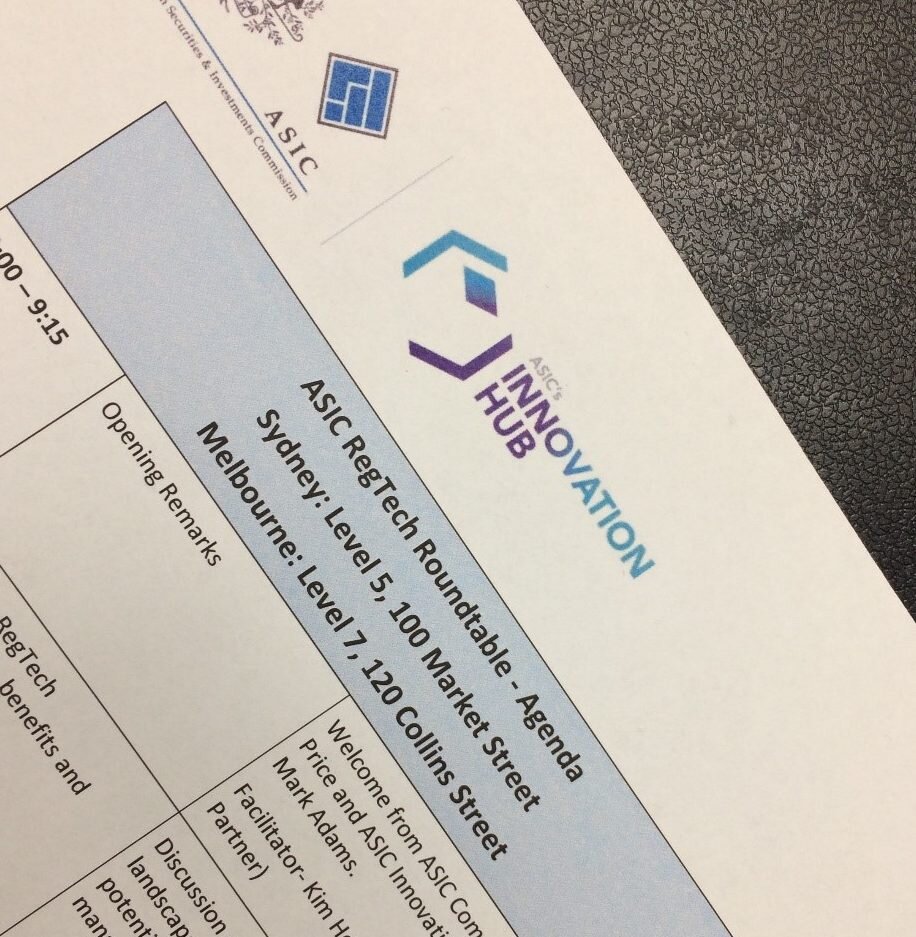Regtech rising
No doubt you’ve heard about fintech, but what about “regtech”?
Fintech is about using technology to provide financial services. Regtech is about using technology to comply with regulation.
Regtech is not limited to the financial services sector, but that’s where it is growing, for two reasons I think.
There is a huge level of interest and investment in fintech, and regtech uses many of the same technologies as fintech.
The finance sector worldwide is groaning under the weight of ever-increasing regulation. As an example, Australia’s major banks are said to each spend in the order of $300 to $400 million a year on compliance. Financial institutions need regtech to reduce their costs of compliance.
Unlike fintech, regtech seems to be more driven by established market players than new entrants, probably because the established players have the big compliance costs to carry.
ASIC roundtable
Curious to find out more about regtech, I accepted an invitation from ASIC’s Innovation Hub to a roundtable meeting on 9 February. Judging by the number of people who came along, it’s a hot topic. More than 80 people attended in Sydney and Melbourne.
The technology behind regtech
One of the speakers at the ASIC roundtable outlined the key technology advancements that are enabling regtech. I’ve listed them below with a short not-too-technical summary (thanks Wikipedia).
Blockchain: a distributed database that maintains a continuously growing list of ordered records called blocks. Once recorded, the data in a block cannot be altered.
Cognitive computing and artificial intelligence (AI): cognitive computing refers to technology platforms based on AI and signal processing that mimic the functioning of the human brain. AI is intelligence exhibited by machines.
The internet of things: the networking through the internet of physical devices, vehicles, buildings, and other items.
Open source/APIs: open source refers to computer program source code being available to the general public for use or modification. API stands for application programming interface. APIs make it easier for developers to use technologies in building applications.
Cloud computing: internet-based computing that provides shared computer processing resources and data to computers and other devices on demand.
Big data: data sets that are so large or complex that traditional data processing application software is inadequate to deal with them.
Semantic web: common data formats and exchange protocols on the Web which allow data to be shared and reused across application, enterprise, and community boundaries.
Using technology to assist in compliance is nothing new, but these technologies offer the possibility of a giant leap forward in capability.
The main areas where it’s thought that this new technology will assist in compliance are in monitoring and reporting, and for capturing regulatory change.
Regtech and the regulators
While regtech is being driven by the regulated rather than the regulators, regulators are also very interested in using regtech to improve their operations. ASIC has already automated many of its market surveillance activities and is also working at the moment on a pilot program with a regtech company that will use technology to review websites for potentially misleading statements.
One of the attendees at the ASIC roundtable, Redmarker, is developing this kind of surveillance software.
There is a concern that regtech could become an enabler of more regulation. Just as improving bandwidth leads to more data being transmitted, regtech could lead to more regulation. (You can imagine the justification for new regulation in the future: “Why are you objecting to this rule? You can just automate it!”).
Obstacles
Some of the obstacles faced by new technology for compliance include:
Large institutions which have invested in existing technologies may be reluctant to adopt new technologies unless they can see a clear value proposition.
Some personnel in financial institutions may be hesitant to embrace technologies that could make them redundant.
Privacy concerns about some of the technologies, such as programs that will read emails of staff for potential compliance issues.
Further reading
If you want to dig deeper on regtech, check out this recent paper from Ross Buckley at UNSW’s Centre for Law Markets and Regulation, and this report from the Institute of International Finance.
Patrick Dwyer
Legal Director

